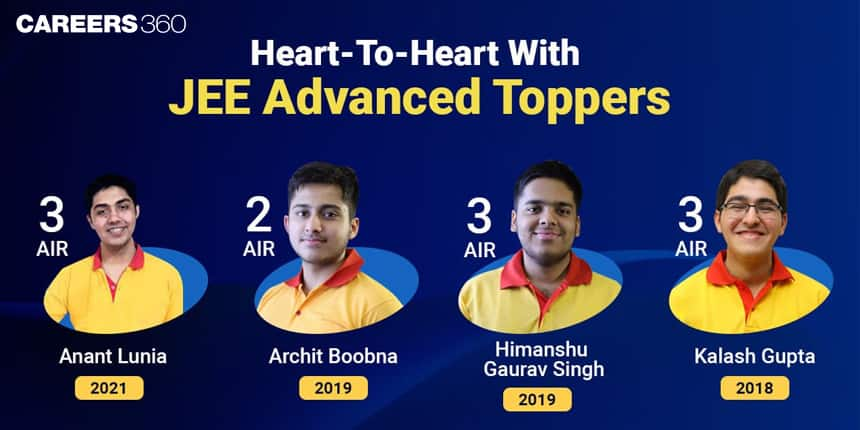Amity University-Noida B.Tech Admissions 2026
Among top 100 Universities Globally in the Times Higher Education (THE) Interdisciplinary Science Rankings 2026
When we hear about a topper, at the first moment our mind curiously starts searching for answers to questions: what would have been their strategies? Do they read some specific books we are not aware of? What timetable do they follow? Would they have prepared themselves for long? Is dropping a year a good idea? What are those tactics that made them succeed? Should you focus on the board exams or JEE Main? Should you revise the syllabus one more time or practise JEE Main mock-tests and test papers? A host of questions plague aspirants’ thoughts instantly.

Careers360 conducted a webinar with JEE Advanced toppers from previous years to put all these questions to them and find out answers for all the aspirants of JEE Main and Advanced.
Doing well in the JEE (Main and Advanced) is the dream of a large number of high school students in India. Securing a good rank in the JEE is your gateway to entering the top IITs, NITs, IIITs, GFTIs, and other premier engineering colleges of the country. However, the competition is fierce and students should make use of all the assistance that they can get to prepare and attempt the JEE.
One of the best ways to get good insights is to find out what worked for students who have previously been in the same situation and succeeded in getting a good rank. The four achievers who participated in the webinar – Heart to Heart with JEE Advanced Toppers – were:

Anant Lunia secured AIR 3 in the JEE Advanced 2021 and is pursuing B.Tech in CSE at the Indian Institute of Technology, Delhi. He took coaching at FIIT-JEE from Class 10 for three years.
 Archit Boobna AIR 2, JEE Advanced, 2019
Archit Boobna AIR 2, JEE Advanced, 2019
Archit Boobna secured AIR 2 in the JEE Advanced 2019 and is pursuing B.Tech in CSE at the Indian Institute of Technology, Delhi. His preparation journey began from FIIT-JEE, South Delhi, when he was in Class 6.

Himanshu Gaurav Singh AIR 3, JEE Advanced, 2019
Himanshu Gaurav Singh secured AIR 3 in the JEE Advanced 2019 and is pursuing B.Tech in CSE at the Indian Institute of Technology, Delhi. He believes that some of the skills he acquired during the preparation are relevant even now. He took coaching for three years at FIIT-JEE from Class 10.

Kalash Gupta AIR 3, JEE Advanced, 2018
Kalash Gupta secured AIR 3 in the JEE Advanced 2018 and is currently pursuing B.Tech in CSE at the Indian Institute of Technology, Delhi. He joined the FIIT-JEE in Class 9 to prepare for NTSE and continued there for JEE preparation.
Let’s get the answers to all those questions from JEE Advanced toppers, one by one:
Himanshu Gaurav Singh who secured AIR 3 in the JEE Advanced 2019 answers that a significant portion of JEE Main does intersect with JEE Advanced. So, aspirants get prepared for JEE Main while preparing for JEE Advanced.
Specific preparation for JEE Main means you are talking about those portions of JEE Main that do not intersect with JEE Advanced. Remember, Class 12 Board exams and competitive exams are scheduled very close to each other. So, while preparing for the Board examination, give a little more emphasis on those topics relevant for JEE Main. Apart from this, do start practising test papers or mock tests and analyze your results. That would be sufficient for JEE Main.
Kalash Gupta, AIR 3 in the JEE Advanced 2018, explains that the two-year timeline suited him as he started preparing for JEE in Class 11. He didn’t need a timetable because he just followed whatever had been taught in the class daily. And the institute provides you with sufficient material to keep you busy in practising. So, stay updated on a daily basis and whatever topic you go through, make sure to practise problems from those topics and be sure to attempt an optimum number of mock tests.
While responding to the question, Anant Lunia, AIR 3 in the JEE Advanced 2021 tells you the books he used to read while preparing for JEE Advanced. The books he used to read were:
Among top 100 Universities Globally in the Times Higher Education (THE) Interdisciplinary Science Rankings 2026
Last Date to Apply: 28th Feb | Ranked #43 among Engineering colleges in India by NIRF | Highest Package 1.3 CR , 100% Placements
Recognized as Institute of Eminence by Govt. of India | NAAC ‘A++’ Grade | Upto 75% Scholarships
98% Placement Record | Highest CTC 81.25 LPA | NAAC A++ Accredited | Ranked #62 in India by NIRF Ranking 2025 | JEE & JET Scores Accepted
You can go for more books if you are preparing for the Olympiad or some other examinations.
Archit Boobna who secured AIR 2 in the JEE Advanced 2019 explains how aspirants make mistakes in choosing reference books. Many students prefer foreign authors’ books that are not relevant for JEE Main and Advanced preparation.
Archit Boobna explains that different people have different ways to stay consistent: for some people, creating a timetable and a regular routine works. Find out what strategies work for you - here. For him, it was different in the same way it can be different for each JEE aspirant. He adds that aspirants need to assure to attend classes on a regular basis. Once you start missing classes, it can become your habit. It results in losing your track and eventually consistency. Understand that you are more than 50% consistent if you attend classes regularly.
Beyond that, make sure you complete on time all the assignments and study material that is needed to cover the entire concepts to retain the flow. Don’t leave anything pending for later because once you create a backlog, it becomes difficult to come out of that cycle.
Kalash Gupta said that while you prepare for JEE Advanced, it covers most of the syllabus to prepare for board examination, especially for Physics and Mathematics. For Chemistry, the NCERT books would be sufficient for the board and partly for JEE Advanced. So, there is no requirement to study separately. If you want to score well in the board exam, you can set aside some time, maybe a month or two. This will help you in JEE Main preparation as well. However, by this time, students will be well prepared for the board examination as they have been preparing for JEE Advanced.
After you are through with your board examination, join any coaching institute and you will be provided with sufficient resources such as proper guidance, assignments, study materials and test papers. You just need to follow the instructions and be regular in attending classes.
You can go for self-study too – depending on your calibre. Anant Lunia has listed several books for you, go through them, and test your knowledge with mock tests from time to time.
Anant Lunia answers that last-minute preparation must include short note revision, attempting mock tests regularly, analysing your result and strengthening the topic accordingly. When it comes to the last-minute strategy and preparation, there are many other points to be taken strictly into account. Find out those points here: last minute tips for JEE preparation
It is obvious to be under pressure which increases with the approaching examination. Focus on learning rather than performance. Sharing your concerns with teachers always helps. Keep the competition healthy with your peers, it helps to motivate you and pushes you to do better. Embrace the competition and don’t let it affect your mental health negatively . The JEE is known for checking your mental strength apart from your subject knowledge.
No, it’s not. JEE Advanced tends to test your knowledge in depth. The syllabus is also updated every year. You can learn more about the syllabus for both JEE Main and JEE Advanced here:
This differs from person to person. Find out what strategies work for you - here. However, Kalash Gupta suggests that you master your concepts and topics of Class 11 first and then move on to the syllabus of Class 12.
During the last minute preparation, try to avoid school activities and focus on JEE preparation as only a few days are left.
Whatever study material you have, go through them; go through the notes and attempt mock test papers rather than studying theory in detail. If you have prepared well for the Board examination, it means you already have some level of preparation. In that case, attempt more mock tests to figure out your weak areas and work on those.
Aspirants are most likely to have low phases from time to time. Toppers suggest looking out for the real reasons. Work on those points, talk to teachers and spare more time on the topics in which you are weak. Low phases are usually driven by poor test performance. Don’t care too much about it as you are in a learning phase. So, move on and keep learning.
It will be the same if you study for short hours multiple times, taking breaks in between. And about the seats, it is the same for all. You just need to keep learning and practising.
The offline platform could be much better because of the classroom environment where you have physical interaction with teachers and students. It contributes a lot to the preparation as you have a healthy and competitive environment.
Also Read,
Joining any coaching institute would always be helpful as you will be provided with sufficient resources such as proper guidance, assignments, study materials and test papers. You just need to follow the instructions and be regular with classes. Apart from this, the classroom environment is helpful for physical interaction with teachers and students. It contributes a lot to the preparation as you have a healthy and competitive environment.
If coaching is not an option for you, then, you can go for self-study too. If you have the potential for preparation by doing self-study, then, the books listed by Anant Lunia would be helpful. Go through them, and test your knowledge with mock tests from time to time. Many students have been successful in getting a good rank with self-study. You can find out more here
It is very usual for JEE aspirants to make silly mistakes. Practising a lot, being more attentive, and trying to stay calm during examinations are the best ways to avoid or minimize silly mistakes. Do attempt mock tests to reduce silly mistakes with each practice. Writing things down while practising will also help you to reduce mistakes, maintain speed, and manage time. So, don’t panic and plan your strategy well.
There is no ideal time to start practising the mock tests. It depends on various factors such as your strategy and level of preparation. You can start practising any time during preparation. It would be different at different levels of preparation. One suggestion is to start practising in the early stages of preparation. During the initial stage, practise chapter-wise, subject-wise, and then practise when you have covered more than half of the syllabus.
Anant Lunia answers that he did not prepare short notes exhaustively for all subjects. He did this for some parts of Organic Chemistry, Inorganic Chemistry and for some chapters of Physics which proved helpful. For the rest of the topics and Mathematics, it wasn’t necessary as he focused more on problem-solving. He adds that short notes are ideal resources; so, prepare notes as much as you can for the topics you feel a need.
Archit Boobna explains that it is not easy to crack JEE by starting the preparation during the last days of Class 12. In this case, dropping a year would be a great idea. But you can still start preparing from that time and appear in the examination to get an idea of the exam.
It depends on the JEE Main marks. It is a gateway to enter the NITs, GFTIs, and other premier engineering colleges of the country. Based on the recent results, dropping a year would not be a good idea if you have done well in JEE Main. But if your performance is poor in JEE Main, you can drop a year.
On the other hand, if your performance in the examination is not as per your preparation or performance in the previous mock test regardless of rank and you believe that something serious had gone wrong during the examination, then preparing for one more year and appearing in JEE Advanced is a good bet. If you are not confident enough about JEE Advanced preparation, you should appear for other exams such as BITSAT and VITEEE.
Math is the subject that needs maximum practice. So, just completing the Cengage to know the tips and tricks will not be helpful in JEE Advanced. You can check if this works or not by attempting the previous year's papers.
It is totally fine to focus on one subject a day. But schedule more days for the subject in which you are weak.
To Sum Up
The best advice for the JEE aspirants includes:
You might have more questions about strategy and tips. Find out your answer to the rest of the questions here – Top 16 Tips for Last-Minute JEE Preparation
Watch Now | Heart to Heart with JEE Advanced Toppers
On Question asked by student community
decent chances actually as home state quota seats are 50%. allotments will depend on the JEE rank and not percentile though. in 2025, for female supernumerary it closed at 9286 rank while for open gen it closed at 5573.
So, would advise to use this tool to check the probable
yes you will. Ususally the return is within 7 days i it has failed at the gateway level which it seems to be. Please wait. You will get the money back
Slim chances as in 2025 the closing rank was 118 for SPA Delhi for B.Arch. You will need to wait for the rank list to come in April before getting a better picture. Please check https://engineering.careers360.com/jee-main-college-predictor for the predictions.
Check out https://engineering.careers360.com/jee-main-rank-predictor to know the probable rank
Hi Smita Sharma,
With 47 percentile in JEE Mains 2026, you might get rank around 7,00,000 plus which is very high. Check the link below for the Best engineering colleges available for you based on yours percentile.
Link 1: https://engineering.careers360.com/colleges/list-of-engineering-colleges-in-pune-accepting-jee-main
Hey Abhinav!
You can start your JEE Preparation with ICSE. You can check How to Prepare for JEE Main 2026?- Study Plan and start you preparation.
Among top 100 Universities Globally in the Times Higher Education (THE) Interdisciplinary Science Rankings 2026
Recognized as Institute of Eminence by Govt. of India | NAAC ‘A++’ Grade | Upto 75% Scholarships
70th University Ranked by NIRF | 80th Engineering Rank by NIRF | Accredited by NBA and NAAC A+
Last Date to Apply: 28th Feb | Ranked #43 among Engineering colleges in India by NIRF | Highest Package 1.3 CR , 100% Placements
Highest CTC 44.14 LPA | UGC Approved | 1600+ Recruiters | 100% Placement
NAAC A++ Grade | Recognized as Category-1 Deemed to be University by UGC | 41,000 + Alumni Imprints Globally